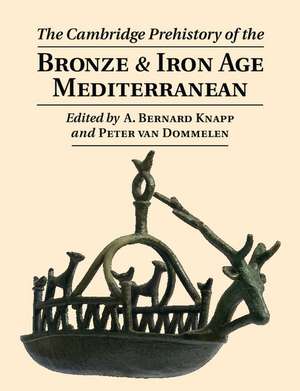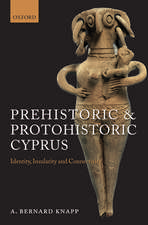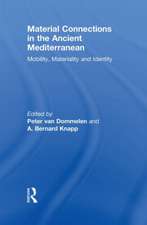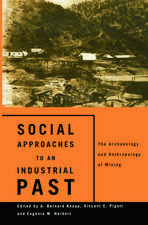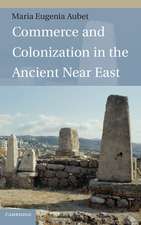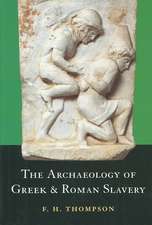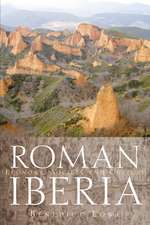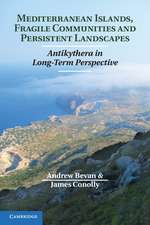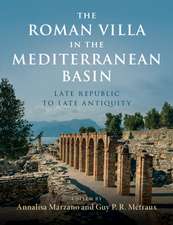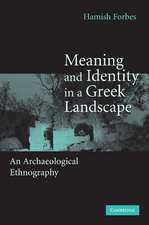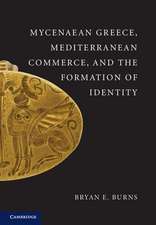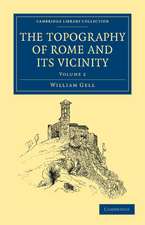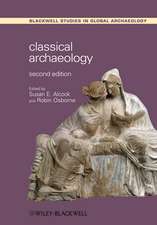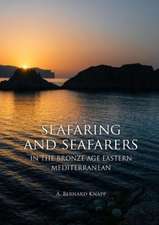The Cambridge Prehistory of the Bronze and Iron Age Mediterranean
Editat de A. Bernard Knapp, Peter van Dommelenen Limba Engleză Hardback – 11 ian 2015
Preț: 1306.58 lei
Preț vechi: 1696.85 lei
-23% Nou
Puncte Express: 1960
Preț estimativ în valută:
250.02€ • 267.35$ • 208.46£
250.02€ • 267.35$ • 208.46£
Carte disponibilă
Livrare economică 28 martie-11 aprilie
Preluare comenzi: 021 569.72.76
Specificații
ISBN-13: 9780521766883
ISBN-10: 0521766885
Pagini: 700
Ilustrații: 223 b/w illus. 57 maps 11 tables
Dimensiuni: 226 x 287 x 35 mm
Greutate: 2.2 kg
Editura: Cambridge University Press
Colecția Cambridge University Press
Locul publicării:New York, United States
ISBN-10: 0521766885
Pagini: 700
Ilustrații: 223 b/w illus. 57 maps 11 tables
Dimensiuni: 226 x 287 x 35 mm
Greutate: 2.2 kg
Editura: Cambridge University Press
Colecția Cambridge University Press
Locul publicării:New York, United States
Cuprins
1. A little history of Mediterranean island prehistory; 2. Inside out? Materiality and connectivity in the Aegean archipelago; 3. Early island exploitations: productive and subsistence strategies on the prehistoric Balearic Islands; 4. Islands and mobility: exploring Bronze Age connectivity in the South-Central Mediterranean; 5. Sicily in Mediterranean history in the second millennium BC; 6. Late Bronze Age Sardinia: acephalous cohesion; 7. Corridors and colonies: comparing fourth-third millennia BC interactions in Southeast Anatolia and the Levant; 8. The Anatolian context of philia material culture in Cyprus; 9. Bronze Age European elites: from the Aegean to the Adriatic, and back again; 10. Greece in the Early Iron Age: mobility, commodities, polities, and literacy; 11. Before 'the gates of Tartessos': indigenous knowledge and exchange networks in the Late Bronze Age far west; 12. Colonizations and cultural developments in the central Mediterranean; 13. The Iron Age in South Italy: settlement, mobility, and culture contact; 14. Migration, hybridization, and resistance: identity dynamics in the Early Iron Age Southern Levant; 15. Cultural interactions in Iron Age Sardinia; 16. Myth into art: foreign impulses and local responses in archaic Cypriot sanctuaries; 17. Mobility, interaction, and power in the Iron Age Western Mediterranean; 18. Sensuous memory, materiality, and history: rethinking the 'rise of the palaces' on Bronze Age Crete; 19. Beyond iconography: meaning-making in Late Bronze Age Eastern Mediterranean visual and material culture; 20. Changes in perceptions of the 'other' and expressions of Egyptian self-identity in the Late Bronze Age; 21. The lure of the artifact? The effects of acquiring Eastern Mediterranean material culture; 22. Stone worlds: technologies of rock-carving and place-making in Anatolian landscapes; 23. Rethinking the late Cypriot built environment: households and communities as places of social transformation; 24. Households, hierarchies, territories, and landscapes in Bronze Age and Iron Age Greece; 25. Connectivity beyond the urban community in central Italy; 26. Long term social change in Iron Age northern Iberia (ca.700–200 BC); 27. Who lives there? Settlements, houses, and households in Iberia; 28. Landscapes and seascapes of Southwest Iberia in the first millennium BC; 29. Domestic and settlement organization in Iron Age Southern France; 30. Beyond the general and the particular: rethinking death, memory, and belonging in Early Bronze Age Crete; 31. From the nineteenth century to the twenty-first: understanding the Bronze argaric lifecourse in the Mediterranean 'far west'; 32. Crossing borders: death and life in second millennium BC southern Iberia and North Africa; 33. An entangled past: island interactions, mortuary practices, and the negotiation of identities on Early Iron Age Cyprus; 34. The violence of symbols: ideologies, identity, and cultural interaction in central Italian cemeteries; 35. The Early Bronze Age Southern Levant: the ideology of an aniconic reformation; 36. Ritual as the setting for contentious interaction: from social negotiation to institutionalized authority in Bronze Age Cyprus; 37. Cult activities among central and north Italian protohistoric communities; 38. Ritual and ideology in Early Iron Age Crete: the role of the past and the east.
Recenzii
'A magnificently multi-faceted, intellectually challenging collection of scholarly voices and interpretations that matches the complexity and dynamism of the Bronze and Iron Age Mediterranean itself. This book will be a stimulus to fresh thinking in and beyond the Middle Sea for many years to come, as well as an ideal point of access for the less familiar.' Cyprian Broodbank, John Disney Professor of Archaeology, University of Cambridge
'The Cambridge Prehistory of the Bronze and Iron Age Mediterranean is ambitious, comparative, thematic, challenging, informative and bang up-to-date, helping readers to grasp the similarities and diversity of Mediterranean communities and societies in the last two millennia BC. The clarity of presentation makes it a pleasure to read.' Bob Chapman, University of Reading
'Widely ranging knowledgeable syntheses of Mediterranean later prehistory that are also theoretically informed are rare; those seeking not to shelter in a regional ghetto but engaging with wider archaeology and history rarer still. This welcome volume is all of the above, and thus both important and special.' Sturt W. Manning, Goldwin Smith Chair of Classical Archaeology and Director of the Cornell Institute of Archaeology and Material Studies, Cornell University
'The Cambridge Prehistory of the Bronze and Iron Age Mediterranean is ambitious, comparative, thematic, challenging, informative and bang up-to-date, helping readers to grasp the similarities and diversity of Mediterranean communities and societies in the last two millennia BC. The clarity of presentation makes it a pleasure to read.' Bob Chapman, University of Reading
'Widely ranging knowledgeable syntheses of Mediterranean later prehistory that are also theoretically informed are rare; those seeking not to shelter in a regional ghetto but engaging with wider archaeology and history rarer still. This welcome volume is all of the above, and thus both important and special.' Sturt W. Manning, Goldwin Smith Chair of Classical Archaeology and Director of the Cornell Institute of Archaeology and Material Studies, Cornell University
Descriere
The Cambridge Prehistory of the Bronze and Iron Age Mediterranean explores contemporary archaeology of the Mediterranean region during the Bronze and Iron Ages.
